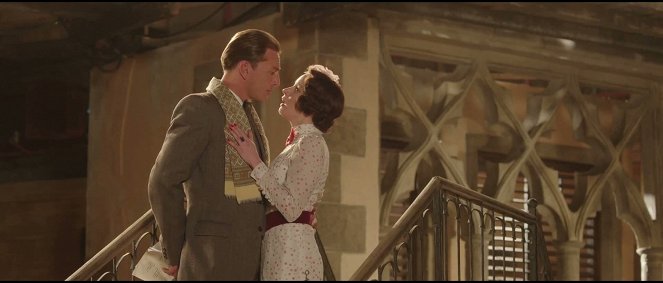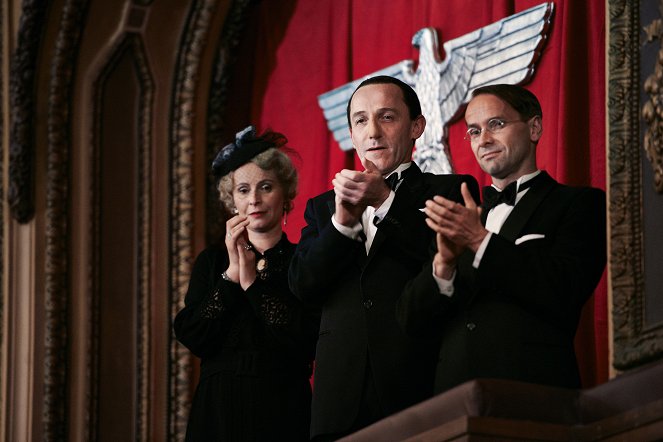Directed by:
Filip RenčScreenplay:
Ivan HubačCinematography:
Petr HojdaComposer:
Ondřej SoukupCast:
Táňa Pauhofová, Karl Markovics, Gedeon Burkhard, Zdenka Procházková, Simona Stašová, Martin Huba, Anna Fialová, Jiří Mádl, Lenka Vlasáková, Pavel Kříž (more)Plots(1)
One of the greatest untold love stories of the 20th century, this is the story of Lída Baarová, a beautiful Czech actress, who conquered Germany's silver screen as well as the heart of one of the Third Reich's most powerful men: the Minister of Propaganda, Joseph Goebbels. How could Hitler's chief ideologist fall in love with a non-Aryan Slavonic beauty whose race had been designated as inferior by the Führer in "Mein Kampf" and whose country was soon to be occupied by the Nazis? How could one of Europe's most glamorous actresses reject offers of stardom from Hollywood in preference to a dangerous romance with the Nazi monster with a deformed leg? The movie will shatter taboos and probe the thin red line between demonic ideology and passions of the heart. (official distributor synopsis)
(more)Videos (2)
Reviews (9)
An empty bubble, perfectly crafted tabloid PR and a desperate report on the state of domestic cinema all in one. I went into it with a preconceived notion, but I was still surprised at how terribly shallow it ended up being. There’s not even a hint of an attempt to get under the skin of any of the characters. Hubač and Renč ride a primitive wave that follows Goebbels' slimy stares and Lída's guileless naivety as a simpleton, with clouds of declamatory side characters around them that are completely useless for moving the plot along. Renč's incompetence as a director is fully manifested in all the meaninglessness as he masks all the primitiveness with camera kitsch, dubious editing, and a strange pleasure in exploitation, which allows relieved volleys of laughter to come out. Sometimes it amazes me how far creative ambitions actually go.
()
When I went to the cinema to see the most anticipated Czech film of the year, I had both options in mind - that it would either be a hit or a dud, and Lída Baarová hovers precariously between both extremes. The life of one of the most beautiful Czech actresses of the 1930s offers some very dense material for a film, so there was, is and will be some potential here. I have to say that more could have been made of it, but I also have to admit that the film has some captivating and imaginative scenes. The desire for worldliness is often a stumbling block in Czech productions, even though success can be achieved in a nice Czech way, and that is why some sequences look too artificial and mechanical. A big plus for me was the intertwining of two timelines, which complemented each other well – I was also impressed by the voice-over of old Baarová, which was one of those moments when ripping off foreign films paid off. Personally, I was more taken with the second half, as the first, though nicely shot, was more protracted, while the second had more momentum and the tragic nature did its part as well. I won't comment on the use of German in the film, as it would be a long story, perhaps I can only add that in many American films foreigners mostly speak English, so why make such a big fuss over a Czech-speaking Hitler. Lída Baarová will probably not go down in the history of Czech cinema as a spectacular big film, but I don't want to unfairly cast aspersions, because there effort was there.
()
I won’t hide that I was truly looking forward to watching a film about Lída Baarová. I wanted to watch the story of one of the most tried Czech actresses from the First Republic and I was lured not only by the huge budget, but also by the actors who were a part of this project. Films like In the Shadow or Habermann's Mill proved that even in our country there is a lot of skillful people who can film a serious historical story. I went to see the film immediately after the Czech president Miloš Zeman and his spokesman Jiří Ovčáček saw it. That’s just as an introduction. Filip Renč’s filmmaking is a total routine but I admit that I really liked Guard No. 47. But then he really pissed me off by his support for the political party ODS and the final push was his filming of spots for Miloš Zeman at the time of his presidential candidacy. That is really lame. I believe that politics do not belong into art and never did. So, I really don’t give a shit that Zeman or Ovčáček saw the movie. I also don’t give a fuck that they liked it. Did Renč really need a pre-premiere for politicians, whom I personally consider to be human hyenas? If he is an artist, he is able to manage in other ways. This film was supported not only by the long-debated grants, but also by Daniel Landa along with some artists from Arabia, as he likes to say. So, it seems that Mr Renč can manage pretty well. Anyway, I would shut up, if I could at least say that the film is good. But it would really have to be good. The screenplay was quite okay. Lída’s story is incredibly strong and sad, so there was not much the screenwriter could have messed up. The problem is the directing. I don’t know where Renč gets his ideas from, and the lowest point is Lída’s sex scene with Goebbels. First we see the legs, where one is limping, then the camera moves into a fireplace where we watch the fire and then in that fire we see the faces of the two in sexual agony. That is probably the worst from the film. But I have to say that such scene was really sickening for me. At the same time, the pre-war atmosphere was done well and the actors tried their best. Táňa Pauhofová was great. The German actors also did not disappoint and Martin Huba and Jiří Mádl really pleased me. I even think that those two had the best characters of the whole movie. Pavel Kříž as Hitler also did not bother me. It’s a pity that Simona Stašová, whom I otherwise hold in high regard, plays a character like from some slapstick comedy. That really does not belong in a story like this one, which is my next issue with the movie. Personally, I’ve seen a lot of European dramas from the period of the Second World War. At times the stories were really strong and sad. However, I have never had a whole tough story lightened up by humor. It really does not belong in these stories and the worst of all that in this movie was, sadly, Mrs. Stašová. Mr Renč, you really cannot shoot a serious film seriously, can you? With everything it entails. After all, the Night of Broken Glass could have been an emotionally nerve-wrecking scene. I also anticipated that the finale would really knock me down. It was going in that direction, but then the director cut it off so quickly that I really didn’t know if I should laugh or cry. The three stars are really out of pity. Even though the movie pissed me a lot, in the end I got used to its narration. On the other hand, should I really be forced to getting used to a film’s narration?
()
(less)
(more)
I can't help but like this film. It's not a clear statement about the fate of Lída Baarová; overall, it's conceived more as something that could have happened, but it could be distorted in itself. The Nazis are portrayed excellently here, and so the only thing that bothered me was that Táňa didn't fit with Lída Baarová at all.
()
A film with ambitions and material for a European blockbuster, with a big budget (by Czech standards) and massive advertising campaign. But the result is disappointing - it’s been a long time since I saw such a disgustingly cheap piece of nonsense. Some characters are dubbed while others not, sometimes it’s exhaustingly lengthy, other times simplistic. Don't even get me started on the soundtrack. It is so inappropriate for the movie it almost made me cringe. If this is supposed to be Renč's masterpiece he had been waiting to make for years, I am afraid of what to expect from his next "regular" project.
()



Ads